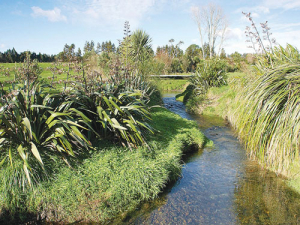Fencing will help to maintain and improve water quality and create a habitat for birds and freshwater species.
Waterway fencing needs to be far enough back to allow for movement/flooding of the waterway.
Start by mapping your waterways and create a fencing plan. Consider the overall layout of your farm; along with protecting waterways, new fencing can improve grazing management and stock control; plan out fence lines and crossing points.
The area between the fence and waterway will slow runoff to ensure as much bacteria, phosphorus and sediment as possible is filtered out before entering the waterway.
Choose your fence setback depending on how you are going to manage the area. There are four main ways to manage your riparian areas as outlined below. All have the benefit of stock exclusion and reducing phosphorous and sediment from entering waterways.
Additional benefits and limitations for each option are listed below to help you decide on the fence setback that will best suit your needs.
With a grass filter strip between fence and waterway, additional benefits are low cost and small loss of grazing land.
However, there are limitations; weed control is required, there is no shading of stream and there is minimal habitat for bird and aquatic life. There is also minimal bank stabilisation without deeper rooted vegetation
With low planting between fence and waterway, there are many benefits: stream bank stability, small loss of grazing land, you can make use of sprays targeted to broadleaf species, it helps control weed growth and there is shade and cover for fish and insect life.
Limitations are that weed control is required and there is minimal habitat for birdlife.
With full planting between fence and waterway you will have reduced drain maintenance and an attractive asset for your farm. It provides shade and keeps water cool and there is increased habitat for birds.
But it comes with higher costs, larger loss of grazing land, weed control for at least two to three years.
Fencing in flood-prone areas
- Use fewer upright posts and less wire; this way less debris will catch on the fence. Do not use netting as it will trap debris.
- Fasten wires to the downstream, back side of posts to allow the staples to pop and the wire to drop rather than pulling out the posts and strainers if there’s a flood.
- Use unbarbed staples so wires can pop off more easily.
- Erect fences parallel with the way the stream floods so the fence does not collect debris.
- Set fences further back where active erosion is occurring.
- Construct separate ‘blow-out’ sections across flood channels.
• Article source: DairyNZ
















